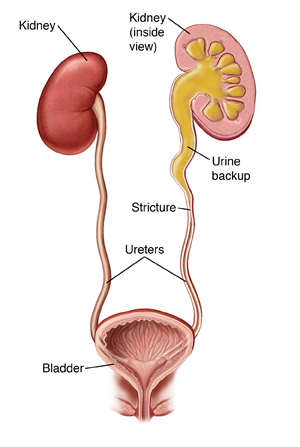Dr. Rajesh Dhake - Ureteric Stricture
Ureteric Stricture
The ureter is the tube that drains urine from the kidney down to the bladder. In some conditions, a portion of the ureter can be narrowed, which is called a stricture.This can be congenital, or the result of scarring from previous surgery, urinary stones, or other causes.Patients undergoing treatment such as a ureteroscopy for kidney, ureteric stone management or urinary diversion is at great risk for developing ureteral stricture.
Diagnosis of Ureteric Stricture
Symptoms of ureteral stricture may include pain, loin lump, flank tenderness, and/or urinary tract infection.

Ureteric Stricture Causes
It is diagnosed by IVU (intravenous urogram) or retrograde urethrogram to determine the site and degree of stricture.
- Ureteroscopy
- Open or laparoscopic injury
- Radiation therapy
- Urinary diversions
- Renal transplantation
Ureteric Stricture Treatment
- Balloon dilation
- Endoureterotomy
- Placement of metal ureteral stents
- Laparoscopic repair / Open surgery
FAQs
WHAT IS UROLOGY?
Urology is a surgical speciality that addresses male and female diseases of the urinary tract, as well as male reproductive system disorders. Urology is a part of health care that deals with diseases of the male and female urinary tract (kidneys, ureters, bladder and urethra). It also deals with the male organs that are able to make babies (penis, testes, scrotum, prostate, etc.). Since health problems in these body parts can happen to everyone, urologic health is important.
WHAT CAN I DO TO MAINTAIN GOOD UROLOGIC HEALTH ?
The best way to avoid urological problems is to maintain good overall health habits, including exercising regularly, maintaining a healthy weight and avoiding tobacco, excessive alcohol, and caffeine.You should also avoid foods or substances that remove water from the body, known as diuretics.
THERE’S BLOOD IN MY URINE. WHAT MAY BE THE CAUSE?
The presence of blood in the urine could be the result of a minor cause or a serious underlying medical condition. To determine the source, a urologist will perform a thorough evaluation. The blood could be the result of an infection, kidney or bladder stones, cancer of the urinary system, or injury.
IT’S PAINFUL TO URINATE. WHAT COULD BE CAUSING THE PROBLEM?
There are many conditions that could result in painful urination. An infection of the urinary tract or prostate is a common cause, along with obstructions in the urethra, kidney, bladder, or prostate.